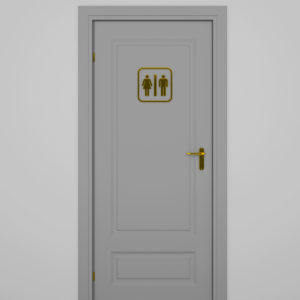You would have to be pretty isolated these days to not be aware of the so-called bathroom issue that centers on transgender individuals, their rights and the obligation of others to accommodate them or find themselves in violation of how President Obama and his administration see the law.
To listen to most liberals and the coverage in the mainstream media, you would think only a hateful narrow-minded bigot would have any hesitation in allowing people to use public facilities based solely on how that person has decided to identify in terms of gender. However, this simplistic viewpoint is encountering strong resistance among real people, especially parents.
As much as anything else, the amount of discussion, strong-armed tactics of the Justice Department, and favorable media attention in the direction of transgender Americans just seems to be a bit much to a lot of us. You might conclude the government is finally taking action to remedy a problem that involves huge numbers of people suffering at the hands of an intolerant majority of heterosexuals, mostly those in the white privilege universe. You would be wrong.
For starters, just how many people are in this group? A quick Google search yields a story from the Albany (N.Y.) Times Union (December 5, 2011) that puts the number of transgender people at 700,000. That would be 0.3 percent of Americans. Three-tenths of a single percent. The article goes on to estimate the number of gay, lesbian and bi-sexual Americans to be slightly over 8 million, or 3.5 percent of the population. In other words, combined, the LGBT population totals less than 4 percent.
A person can be entirely sympathetic to fair treatment, strongly oppose actual discrimination, and generally be a fair-minded individual without being compelled to conclude that more than 95 percent of Americans ought to be made to accommodate any and all demands from 0.3 percent of the population.
Recently, the Charlotte (N.C.) Observer editorialized that while it might make women uncomfortable, they needed to get used to the sight of a male using the same public facilities as biological women, if transgender people are to receive fair treatment. Unless I am missing something, we are now being asked to accept instantly something that last year would have constituted illegal indecent exposure.
Recently, a college-age student went to Oregon. He was a white male, under 6 feet in height. He decided to see what students would say in response to his confiding to them that he saw himself as a 6-foot, 2-inch Chinese woman. Surely to the delight of liberals throughout the nation, these students tortured all logic to allow as how if that was how he “self-perceived,” then that is the way he deserved to be seen and treated.
For a large number of people I consider reasonable, all of this becomes a tad absurd. People thinking they are cats does not make them cats, say we. Maybe you are entitled to think of yourself in any way you want. That, however, should not obligate everyone in the world to turn themselves inside out to make sure that you never feel badly.
By the way, just for the record, white males of European descent who are heterosexual actually encounter situations where we get treated like crap. I can vouch for this. Some would call this life.
The incredible amount of attention and discussion given to accommodating transgender Americans really is about more than access to public bathrooms. In a narrow sense, even the particular topic ought to include a conversation on other situations such as a public shower. Do we really want teen-age girls to be told that any male who wants to declare himself transgender has the legal right to be in that same shower as her?
In a broader context this debate should focus on just how much accommodation is reasonable to expect, much less to demand as a matter of a legal right. When is it that more than nine in 10 Americans will be allowed to say: “We don’t hate you. We even understand and agree you deserve not to be discriminated against. However, this has become an argument that centers on personal comfort levels. You need to deal with being uncomfortable. It is more fair, more logical, and more reasonable than asking all the rest of us to adjust to you. Where possible, we will attempt to reduce this discomfort by providing separate facilities. However, a good deal of the time, you are just going to have to suck it up and deal with things.”

